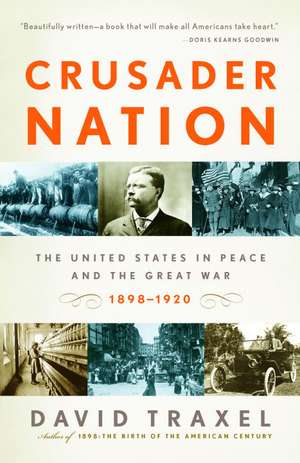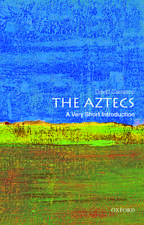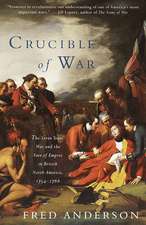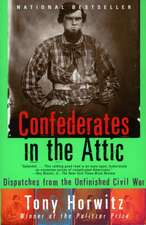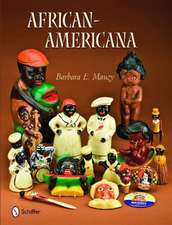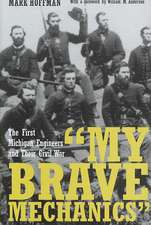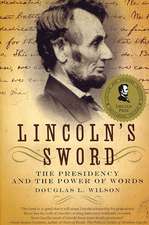Crusader Nation: The United States in Peace and the Great War, 1898-1920
Autor David Traxelen Limba Engleză Paperback – 31 dec 2006
Preț: 135.96 lei
Nou
Puncte Express: 204
Preț estimativ în valută:
26.02€ • 27.23$ • 21.65£
26.02€ • 27.23$ • 21.65£
Carte disponibilă
Livrare economică 10-24 martie
Preluare comenzi: 021 569.72.76
Specificații
ISBN-13: 9780375724657
ISBN-10: 0375724656
Pagini: 413
Ilustrații: 19 ILLUSTRATIONS
Dimensiuni: 132 x 203 x 30 mm
Greutate: 0.43 kg
Editura: Vintage Books USA
ISBN-10: 0375724656
Pagini: 413
Ilustrații: 19 ILLUSTRATIONS
Dimensiuni: 132 x 203 x 30 mm
Greutate: 0.43 kg
Editura: Vintage Books USA
Notă biografică
Victorian David Traxel is the author of 1898: The Birth of the American Century. He holds a Ph.D. from the University of California at Santa Cruz and is an associate professor of history at the University of the Sciences in Philadelphia, where he lives with his wife, the photographer Rosemary Ranck.
Extras
American Renascence
Looking back . . . I have thought of the period in America, including the last few years of the nineteenth century and the early years of the twentieth, as the American Renascence, even the Great American Renascence.
Ray Stannard Baker
You see, getting down to the bottom of things, this is a pretty raw, crude civilization of ours—pretty wasteful, pretty cruel, which often comes to the same thing, doesn’t it? And in a lot of respects we Americans are the rawest and crudest of all. Our production, our factory laws, our charities, our relations between capital and labor, our distribution—all wrong, out of gear. We’ve stumbled along for a while, trying to run a new civilization in old ways, but we’ve got to start to make this world over.
Thomas Edison, 1912
In 1898 the United States stepped into the realm of international power politics for the first time. The country had already become a global economic presence, and was feared as a competitor because of its tremendous natural resources and industrial efficiency. Militarily, however, it was viewed with condescension by the Great Powers until it quickly and decisively thrashed Spain in 1898, seizing as the fruits of victory the colonies remaining in that faded empire: Cuba, which was soon given a limited independence, Puerto Rico, Guam, and the Philippines. Mixed into this rather amateurish adventure were motives of economic gain, national prestige, fear of German or other European expansion into the Caribbean, desire for strategic naval bases, and anger over the blowing up of the battleship Maine. But there was also a strong sense of moral outrage about the way the Spanish had been mistreating Cuban civilians while suppressing a revolt on the island. Hundreds of thousands of men, women, and children had died in concentration camps just ninety miles off the American shore, and the public demanded that an end be put to such horrors.
America was encouraged to take the path to a world role by Great Britain, looking for allies against the rising and aggressive strength of Germany. Rudyard Kipling, celebratory poet of the world-circling British Empire, wrote a widely distributed poem urging Americans to “Take up the White Man’s burden” of civilizing “sullen peoples, half devil and half child.”
The challenge was taken up, and yet, in this American assumption of global responsibilities there was a shyness and uncertainty even among those such as Theodore Roosevelt who urged a “large” policy on the United States. The country needed to take a more active role in international affairs, these men believed, if only to protect itself in a Darwinian world where the strong devoured the weak. China, one of the countries being picked apart by stronger nations, provided a negative example for such Americans. The United States could not, argued Roosevelt’s close friend and political ally Senator Henry Cabot Lodge, “allow itself to become a hermit nation hiding a defenseless, feeble body within a huge shell . . . shut up and kept from its share of the world’s commerce until it was smothered by a power hostile to it in every conception of justice and liberty.” At the same time, the policy of extending the country’s reach across the seas invited attack on these “hostages to fortune,” as Roosevelt recognized by calling the new Philippine colony “our Achilles’ heel.” A newspaper doggerel writer spoke for many who were unhappy with imperialism:
We’ve taken up the white man’s burden of ebony and brown; Now will you tell us, Rudyard how we may put it down?
Roosevelt had been the Man of the Year in 1898, and also for the decade that followed, the ideal spokesman for his generation and a worthy representative of their ambitions. These were roles for which he was both born, in 1856, and self-made. His father was a member of a wealthy old New York “Dutch” family, his mother came from plantation-owning stock in Georgia, and young “Teedie” had grown up during the Civil War in a household reflecting the regional differences. He had enjoyed a childhood replete with all the good things money could buy, but marred by ill health and poor eyesight, his own weak body making him defenseless against bullies until he overcame these physical disabilities through exercise and will. Some of that exercise had come from long expeditions running through Long Island fields and woods with butterfly net and rifle to collect natural-history specimens, and some through steady work with dumbbells and other such instruments of torture taken up at the urging of his father, who told him, “You have the mind but not the body, and without the help of the body the mind cannot go as far as it should. You must make your body. It is hard drudgery to make one’s body, but I know you will do it.” He did, and kept doing so all his life. He also worked at making his mind; in adulthood he could speak three languages besides English with some facility, and could read seven, while he continued his intense, if rather bloodstained, study of birds, animals, and nature, and became a prolific historian and writer as well.
After graduating from Harvard and after an early marriage, Roosevelt entered politics, much to the dismay of friends and family, who regarded that line of work as appropriate only for saloon keepers, corrupt hacks, and Irishmen. “I answered that if this were so it merely meant that the people I knew did not belong to the governing class, and that the other people did—and that I intended to be one of the governing class; that if they proved too hard-bit for me I supposed I would have to quit, but that I certainly would not quit until I had made the effort and found out whether I really was too weak to hold my own in the rough and tumble.” He more than held his own, serving three terms in the New York assembly, where he became an important part of the reform element in the Republican Party. But then both his beloved wife, Alice, and his mother died within hours of each other on February 14, 1884, and he fled to the frontier West to raise cattle, shoot big game, and mourn. A few years later, Roosevelt remarried and returned to politics, running unsuccessfully for mayor of New York, then serving as U.S. civil service commissioner before winning public attention as the aggressive president of New York’s police commission. His intelligence, honesty, and energy had gained him many admiring allies, but his combative temperament and impatient self-righteousness had also bred enemies. President Benjamin Harrison observed about his civil service commissioner that he “wanted to put an end to all the evil in the world between sunrise and sunset.”
It looked for a while as if the firebrand’s career would go no further. He had campaigned strenuously for William McKinley in the hard-fought and divisive election of 1896, but, even so, after the victory McKinley was hesitant to appoint him assistant secretary of the navy. “I want peace,” the new president told one of Roosevelt’s supporters, “and I am told that your friend Theodore—whom I know only slightly—is always getting into rows with everybody. I am afraid he is too pugnacious.” These doubts were overcome, allowing Roosevelt to perform superbly in preparing the navy for the war with Spain. As soon as he felt he had done all he could for that service, he resigned to organize the First Volunteer Cavalry, popularly known as Roosevelt’s Rough Riders, which he dashingly led to victory in Cuba.
The young politician had a genius for publicity. He knew how to charm and manipulate the press, while journalists appreciated his glamour, outspokenness, and charismatic flair for action. Coming back from the war as one of the most famous men in the country, he was able to mount a winning campaign for governor of New York in that fall of 1898. Two years later, having alienated state Republican bosses with his modest attempts at regulating business and protecting New York’s natural resources, he was kicked upstairs to join William McKinley’s ticket as vice-presidential candidate. They won the election easily against William Jennings Bryan and Adlai Stevenson, but on September 6, 1901, McKinley was shot twice in the stomach by an anarchist named Leon Czolgosz, and died eight days later from the resulting infection. Theodore Roosevelt became president; at just forty-two years old he was the youngest before or since to hold that office.
Men and women of the new president’s generation had been waiting impatiently for their turn at the levers of power. They had grown up both inspired and burdened by their fathers’ glory, a glory won first on the battlefields of the Civil War and then enhanced by their own part in the prodigious growth of the American economy and American industrial might in the decades after that struggle. But social disruptions and suffering on the same enormous scale had accompanied that growth: abject poverty, especially in the burgeoning cities; women and children working long hours at dangerous tasks; fathers who could not earn enough even when laboring thirteen- or fourteen-hour days in mines and factories to support their families. In the middle of the nineteenth century there had been only a few millionaires; now there were thousands. Such were the disparities in wealth that while children went unfed, the rich would spend tens of thousands of dollars on dinner parties where guests dined off solid-gold plates or, as at one given by Caroline Astor, would use sterling-silver trowels to dig through heaps of sand arranged on the table to find buried treasure troves of diamonds and rubies.
Sometimes these galas were presented as benefits for the poor. In the winter of 1896, during the depths of the worst economic depression up to that time in American history, Mr. and Mrs. Bradley Bradley-Martin, perturbed by what they were reading in newspapers about the misery of the unemployed, decided to give a costume ball to help them find work. Mrs. Bradley-Martin reportedly exclaimed, “It would give such impetus to trade!”
The couple was wealthy enough to enjoy an elaborate mansion in New York, a town house in London, and a shooting estate in Scotland; a notable social coup had been achieved in marrying their sixteen-year-old daughter to an English aristocrat, Lord Craven. Louis XIV’s glittering eighteenth-century court provided the theme for their costume ball, and the luxurious Waldorf-Astoria hotel was the chosen venue, its Grand Ballroom transformed into the Great Hall of Mirrors at Versailles. Employment was undoubtedly provided for hairdressers, jewelers, musicians, couturieres, and even some historians of fashion as the seven hundred guests arrived on February 10, 1897, dressed as Renaissance, Elizabethan, French, and a few American historical figures. European royalty were particular favorites, though Anne Morgan, youngest daughter of the powerful financier J.P., came as Pocahontas in a beautifully beaded costume reportedly made by “real Indians.” August Belmont, financier and star of New York society, wore a full suit of steel armor inlaid with gold that cost him $10,000. Mrs. Theodore Roosevelt attended, while her husband, police commissioner at the time, oversaw 250 of New York’s finest as they ensured that anarchists and other unruly elements did not intrude. The overall expenses were paid for by the Bradley-Martins, and amounted to a stunning $369,000. This at a time when the average workman, if he could find work, earned $500 a year. It is no wonder that just two years later, in 1899, the sociologist Thorstein Veblen would write about “conspicuous consumption” in his book The Theory of the Leisure Class, noting, “To gain and to hold the esteem of men, it is not sufficient merely to possess wealth or power. The wealth or power must be put in evidence.”
Such a vulgar display, covered in great detail in contemporary newspapers, called down upon the Bradley-Martins a storm of criticism from both press and pulpit alike. While there were few public defenders of the hosts, who ended up fleeing to a more understanding Europe for refuge, there were certainly those who supported the inequality brought about by the raw capitalism of the time. Two such were the English philosopher Herbert Spencer and the American sociologist William Graham Sumner, who argued that society was just like the wilderness of nature where Darwinian evolution took place, and that only those who were strong and adaptable, those who were “fittest,” should survive, flourish, and grow rich—or at least comfortable. This philosophy of social Darwinism was used as a scientific basis for arguing against laws to ameliorate the conditions of poverty or restrain competition. Any attempt to interfere would be against “natural law.”
John D. Rockefeller, one of the richest of all Americans, wrote that all “failures which a man makes in his life are due almost always to some defect in his personality, some weakness of body, or mind, or character, will, or temperament.” And there were spiritual authorities who argued that this was the way God wanted the world. Russell H. Conwell, Baptist minister and founder of Temple University, had an acclaimed speech, or sermon, entitled “Acres of Diamonds,” that he recited more than five thousand times in the years at the end of the nineteenth century. In the course of two hours, he would exhort his listeners to “get rich, and it is your duty to get rich . . . to make money honestly is to preach the gospel. . . . If you can honestly attain unto riches . . . it is your Christian and godly duty to do so.” Those who suffered poverty deserved their lot. “To sympathize with a man whom God has punished for his sins, thus to help him when God would still continue a just punishment, is to do wrong, no doubt about it.” All should remember that “there is not a poor person in the United States who has not been made poor by his own shortcomings, or by the shortcomings of some one else.”
But many of Roosevelt’s generation, born around the time of the Civil War, worried by and feeling guilty over the great contrast between wealth and poverty that had become so obvious in American cities, were determined to tame social and economic chaos and restore a sense of justice to the system. The name usually given to the general movement to reform and realign American society is progressivism. Though there were different hopes and expectations, as well as contradictions, in the various groups called progressive, they all shared the optimistic belief that society not only could be improved through peaceful, reasoned action, but might actually be made perfect—though definition of that perfection varied greatly. This desire to better the world was also reflected in the arts: in literature, where writers such as Theodore Dreiser, Frank Norris, and Upton Sinclair revealed the sordid side of urban and industrial life; in painting, where Robert Henri’s “Ashcan” school also depicted factories, grimy allies, and slums; even in the new art of motion pictures, which joined the fight with films that exposed the misuse of prison labor or the evils of the white slave traffic. The reform city government of Cleveland, Ohio, financed a semidocumentary to raise money for its battle against the diseases of the slums.
From the Hardcover edition.
Looking back . . . I have thought of the period in America, including the last few years of the nineteenth century and the early years of the twentieth, as the American Renascence, even the Great American Renascence.
Ray Stannard Baker
You see, getting down to the bottom of things, this is a pretty raw, crude civilization of ours—pretty wasteful, pretty cruel, which often comes to the same thing, doesn’t it? And in a lot of respects we Americans are the rawest and crudest of all. Our production, our factory laws, our charities, our relations between capital and labor, our distribution—all wrong, out of gear. We’ve stumbled along for a while, trying to run a new civilization in old ways, but we’ve got to start to make this world over.
Thomas Edison, 1912
In 1898 the United States stepped into the realm of international power politics for the first time. The country had already become a global economic presence, and was feared as a competitor because of its tremendous natural resources and industrial efficiency. Militarily, however, it was viewed with condescension by the Great Powers until it quickly and decisively thrashed Spain in 1898, seizing as the fruits of victory the colonies remaining in that faded empire: Cuba, which was soon given a limited independence, Puerto Rico, Guam, and the Philippines. Mixed into this rather amateurish adventure were motives of economic gain, national prestige, fear of German or other European expansion into the Caribbean, desire for strategic naval bases, and anger over the blowing up of the battleship Maine. But there was also a strong sense of moral outrage about the way the Spanish had been mistreating Cuban civilians while suppressing a revolt on the island. Hundreds of thousands of men, women, and children had died in concentration camps just ninety miles off the American shore, and the public demanded that an end be put to such horrors.
America was encouraged to take the path to a world role by Great Britain, looking for allies against the rising and aggressive strength of Germany. Rudyard Kipling, celebratory poet of the world-circling British Empire, wrote a widely distributed poem urging Americans to “Take up the White Man’s burden” of civilizing “sullen peoples, half devil and half child.”
The challenge was taken up, and yet, in this American assumption of global responsibilities there was a shyness and uncertainty even among those such as Theodore Roosevelt who urged a “large” policy on the United States. The country needed to take a more active role in international affairs, these men believed, if only to protect itself in a Darwinian world where the strong devoured the weak. China, one of the countries being picked apart by stronger nations, provided a negative example for such Americans. The United States could not, argued Roosevelt’s close friend and political ally Senator Henry Cabot Lodge, “allow itself to become a hermit nation hiding a defenseless, feeble body within a huge shell . . . shut up and kept from its share of the world’s commerce until it was smothered by a power hostile to it in every conception of justice and liberty.” At the same time, the policy of extending the country’s reach across the seas invited attack on these “hostages to fortune,” as Roosevelt recognized by calling the new Philippine colony “our Achilles’ heel.” A newspaper doggerel writer spoke for many who were unhappy with imperialism:
We’ve taken up the white man’s burden of ebony and brown; Now will you tell us, Rudyard how we may put it down?
Roosevelt had been the Man of the Year in 1898, and also for the decade that followed, the ideal spokesman for his generation and a worthy representative of their ambitions. These were roles for which he was both born, in 1856, and self-made. His father was a member of a wealthy old New York “Dutch” family, his mother came from plantation-owning stock in Georgia, and young “Teedie” had grown up during the Civil War in a household reflecting the regional differences. He had enjoyed a childhood replete with all the good things money could buy, but marred by ill health and poor eyesight, his own weak body making him defenseless against bullies until he overcame these physical disabilities through exercise and will. Some of that exercise had come from long expeditions running through Long Island fields and woods with butterfly net and rifle to collect natural-history specimens, and some through steady work with dumbbells and other such instruments of torture taken up at the urging of his father, who told him, “You have the mind but not the body, and without the help of the body the mind cannot go as far as it should. You must make your body. It is hard drudgery to make one’s body, but I know you will do it.” He did, and kept doing so all his life. He also worked at making his mind; in adulthood he could speak three languages besides English with some facility, and could read seven, while he continued his intense, if rather bloodstained, study of birds, animals, and nature, and became a prolific historian and writer as well.
After graduating from Harvard and after an early marriage, Roosevelt entered politics, much to the dismay of friends and family, who regarded that line of work as appropriate only for saloon keepers, corrupt hacks, and Irishmen. “I answered that if this were so it merely meant that the people I knew did not belong to the governing class, and that the other people did—and that I intended to be one of the governing class; that if they proved too hard-bit for me I supposed I would have to quit, but that I certainly would not quit until I had made the effort and found out whether I really was too weak to hold my own in the rough and tumble.” He more than held his own, serving three terms in the New York assembly, where he became an important part of the reform element in the Republican Party. But then both his beloved wife, Alice, and his mother died within hours of each other on February 14, 1884, and he fled to the frontier West to raise cattle, shoot big game, and mourn. A few years later, Roosevelt remarried and returned to politics, running unsuccessfully for mayor of New York, then serving as U.S. civil service commissioner before winning public attention as the aggressive president of New York’s police commission. His intelligence, honesty, and energy had gained him many admiring allies, but his combative temperament and impatient self-righteousness had also bred enemies. President Benjamin Harrison observed about his civil service commissioner that he “wanted to put an end to all the evil in the world between sunrise and sunset.”
It looked for a while as if the firebrand’s career would go no further. He had campaigned strenuously for William McKinley in the hard-fought and divisive election of 1896, but, even so, after the victory McKinley was hesitant to appoint him assistant secretary of the navy. “I want peace,” the new president told one of Roosevelt’s supporters, “and I am told that your friend Theodore—whom I know only slightly—is always getting into rows with everybody. I am afraid he is too pugnacious.” These doubts were overcome, allowing Roosevelt to perform superbly in preparing the navy for the war with Spain. As soon as he felt he had done all he could for that service, he resigned to organize the First Volunteer Cavalry, popularly known as Roosevelt’s Rough Riders, which he dashingly led to victory in Cuba.
The young politician had a genius for publicity. He knew how to charm and manipulate the press, while journalists appreciated his glamour, outspokenness, and charismatic flair for action. Coming back from the war as one of the most famous men in the country, he was able to mount a winning campaign for governor of New York in that fall of 1898. Two years later, having alienated state Republican bosses with his modest attempts at regulating business and protecting New York’s natural resources, he was kicked upstairs to join William McKinley’s ticket as vice-presidential candidate. They won the election easily against William Jennings Bryan and Adlai Stevenson, but on September 6, 1901, McKinley was shot twice in the stomach by an anarchist named Leon Czolgosz, and died eight days later from the resulting infection. Theodore Roosevelt became president; at just forty-two years old he was the youngest before or since to hold that office.
Men and women of the new president’s generation had been waiting impatiently for their turn at the levers of power. They had grown up both inspired and burdened by their fathers’ glory, a glory won first on the battlefields of the Civil War and then enhanced by their own part in the prodigious growth of the American economy and American industrial might in the decades after that struggle. But social disruptions and suffering on the same enormous scale had accompanied that growth: abject poverty, especially in the burgeoning cities; women and children working long hours at dangerous tasks; fathers who could not earn enough even when laboring thirteen- or fourteen-hour days in mines and factories to support their families. In the middle of the nineteenth century there had been only a few millionaires; now there were thousands. Such were the disparities in wealth that while children went unfed, the rich would spend tens of thousands of dollars on dinner parties where guests dined off solid-gold plates or, as at one given by Caroline Astor, would use sterling-silver trowels to dig through heaps of sand arranged on the table to find buried treasure troves of diamonds and rubies.
Sometimes these galas were presented as benefits for the poor. In the winter of 1896, during the depths of the worst economic depression up to that time in American history, Mr. and Mrs. Bradley Bradley-Martin, perturbed by what they were reading in newspapers about the misery of the unemployed, decided to give a costume ball to help them find work. Mrs. Bradley-Martin reportedly exclaimed, “It would give such impetus to trade!”
The couple was wealthy enough to enjoy an elaborate mansion in New York, a town house in London, and a shooting estate in Scotland; a notable social coup had been achieved in marrying their sixteen-year-old daughter to an English aristocrat, Lord Craven. Louis XIV’s glittering eighteenth-century court provided the theme for their costume ball, and the luxurious Waldorf-Astoria hotel was the chosen venue, its Grand Ballroom transformed into the Great Hall of Mirrors at Versailles. Employment was undoubtedly provided for hairdressers, jewelers, musicians, couturieres, and even some historians of fashion as the seven hundred guests arrived on February 10, 1897, dressed as Renaissance, Elizabethan, French, and a few American historical figures. European royalty were particular favorites, though Anne Morgan, youngest daughter of the powerful financier J.P., came as Pocahontas in a beautifully beaded costume reportedly made by “real Indians.” August Belmont, financier and star of New York society, wore a full suit of steel armor inlaid with gold that cost him $10,000. Mrs. Theodore Roosevelt attended, while her husband, police commissioner at the time, oversaw 250 of New York’s finest as they ensured that anarchists and other unruly elements did not intrude. The overall expenses were paid for by the Bradley-Martins, and amounted to a stunning $369,000. This at a time when the average workman, if he could find work, earned $500 a year. It is no wonder that just two years later, in 1899, the sociologist Thorstein Veblen would write about “conspicuous consumption” in his book The Theory of the Leisure Class, noting, “To gain and to hold the esteem of men, it is not sufficient merely to possess wealth or power. The wealth or power must be put in evidence.”
Such a vulgar display, covered in great detail in contemporary newspapers, called down upon the Bradley-Martins a storm of criticism from both press and pulpit alike. While there were few public defenders of the hosts, who ended up fleeing to a more understanding Europe for refuge, there were certainly those who supported the inequality brought about by the raw capitalism of the time. Two such were the English philosopher Herbert Spencer and the American sociologist William Graham Sumner, who argued that society was just like the wilderness of nature where Darwinian evolution took place, and that only those who were strong and adaptable, those who were “fittest,” should survive, flourish, and grow rich—or at least comfortable. This philosophy of social Darwinism was used as a scientific basis for arguing against laws to ameliorate the conditions of poverty or restrain competition. Any attempt to interfere would be against “natural law.”
John D. Rockefeller, one of the richest of all Americans, wrote that all “failures which a man makes in his life are due almost always to some defect in his personality, some weakness of body, or mind, or character, will, or temperament.” And there were spiritual authorities who argued that this was the way God wanted the world. Russell H. Conwell, Baptist minister and founder of Temple University, had an acclaimed speech, or sermon, entitled “Acres of Diamonds,” that he recited more than five thousand times in the years at the end of the nineteenth century. In the course of two hours, he would exhort his listeners to “get rich, and it is your duty to get rich . . . to make money honestly is to preach the gospel. . . . If you can honestly attain unto riches . . . it is your Christian and godly duty to do so.” Those who suffered poverty deserved their lot. “To sympathize with a man whom God has punished for his sins, thus to help him when God would still continue a just punishment, is to do wrong, no doubt about it.” All should remember that “there is not a poor person in the United States who has not been made poor by his own shortcomings, or by the shortcomings of some one else.”
But many of Roosevelt’s generation, born around the time of the Civil War, worried by and feeling guilty over the great contrast between wealth and poverty that had become so obvious in American cities, were determined to tame social and economic chaos and restore a sense of justice to the system. The name usually given to the general movement to reform and realign American society is progressivism. Though there were different hopes and expectations, as well as contradictions, in the various groups called progressive, they all shared the optimistic belief that society not only could be improved through peaceful, reasoned action, but might actually be made perfect—though definition of that perfection varied greatly. This desire to better the world was also reflected in the arts: in literature, where writers such as Theodore Dreiser, Frank Norris, and Upton Sinclair revealed the sordid side of urban and industrial life; in painting, where Robert Henri’s “Ashcan” school also depicted factories, grimy allies, and slums; even in the new art of motion pictures, which joined the fight with films that exposed the misuse of prison labor or the evils of the white slave traffic. The reform city government of Cleveland, Ohio, financed a semidocumentary to raise money for its battle against the diseases of the slums.
From the Hardcover edition.
Recenzii
“Beautifully written–a book that will make all Americans take heart.”–Doris Kearns Goodwin
“Incisive. . . . Copiously referenced. . . . Brings to life the people and events that cast the foundation of America’s path in the last century.” –Philadelphia Inquirer
“Highly readable. . . . filled with vivid anecdotes [that bring] the period into much sharper focus.” –The Providence Journal
“Engagingly written and insightful. . . . [Traxel’s narrative ] is greatly enhanced by his extensive use of the diaries of average Americans.”–The Washington Times
“Incisive. . . . Copiously referenced. . . . Brings to life the people and events that cast the foundation of America’s path in the last century.” –Philadelphia Inquirer
“Highly readable. . . . filled with vivid anecdotes [that bring] the period into much sharper focus.” –The Providence Journal
“Engagingly written and insightful. . . . [Traxel’s narrative ] is greatly enhanced by his extensive use of the diaries of average Americans.”–The Washington Times
